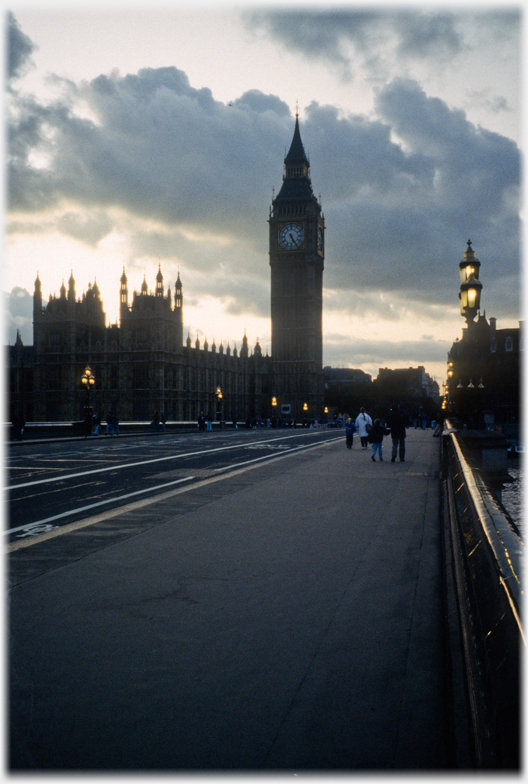
Time
Whatever the origins of our representations... All our knowledge is thus finally subject to time, the formal condition of inner sense. In it they must all be ordered, connected, and brought into relation.
Immanuel Kant (1787/1929)

Time and mind are inseparable. Remove time from the mind and it stops - unless you choose to use it.
Eckhart Tolle (1999)

Big Ben’s inauguration echoed the coming of the railways in marking a new social significance for clock time. Public agreement on time had become necessary, and public time seems an exemplar of public agreement: of
objectivity.
 Over some matters there cannot be objectivity.
So we are given pause when writers place time at the centre of our private mental lives. How is it that a paradigm of the external can also be formative of the internal? An impenetrable question, but it does indicate why authors such as Heidegger can offer titles like Being and Time. Kant’s claim was, and remains, bold, contentious and possibly uncontestable for if our mental lives are structured around time: whatever goes on in our heads is already laid out in time; including challenging that fact; any challenge will automatically have presupposed the
fundamental
Over some matters there cannot be objectivity.
So we are given pause when writers place time at the centre of our private mental lives. How is it that a paradigm of the external can also be formative of the internal? An impenetrable question, but it does indicate why authors such as Heidegger can offer titles like Being and Time. Kant’s claim was, and remains, bold, contentious and possibly uncontestable for if our mental lives are structured around time: whatever goes on in our heads is already laid out in time; including challenging that fact; any challenge will automatically have presupposed the
fundamental
 Another, closely allied, circle was noted regarding consciousness.
place of time. Tolle’s aim is practical:
spiritual development;
Another, closely allied, circle was noted regarding consciousness.
place of time. Tolle’s aim is practical:
spiritual development;
 Tolle gathers, from many religions, ideas on the relation of time to the present.
so necessarily he takes a less absolute view in The Power of Now, time becomes conceptually available, so allowing us mental engagement with the present. Just two faces of time's faceted nature which together foster burgeoning
contradictions.
Tolle gathers, from many religions, ideas on the relation of time to the present.
so necessarily he takes a less absolute view in The Power of Now, time becomes conceptually available, so allowing us mental engagement with the present. Just two faces of time's faceted nature which together foster burgeoning
contradictions.
 Contradictions are everywhere part of life: our minds do not take easily to them.
Contradictions are everywhere part of life: our minds do not take easily to them.
The Norman Kemp Smith translation of The Critique of Pure Reason was published by MacMillan in 1929. The quote is from A98/9. The Pluhar translation was published by Hackett in 1996. It renders this passage as: “No matter from where our presentations arise ... And, as belonging to inner sense, all our cognitions are yet subject ultimately to the formal conditions of inner sense, i.e., to time. In time they must one and all be ordered, connected, and brought into relations.” Tolle’s book The Power of Now was published by New World Library, the quote is from page 40 of the Hodder & Stoughton edition of 2001.
The photograph was taken looking across Westminster Bridge, in central London, towards Big Ben in the autumn of 1993.
Above, hovering on blue introduces a link: click to go, move away to stay.

Saturday 21st June 2025
 ...guide to this site
...guide to this site